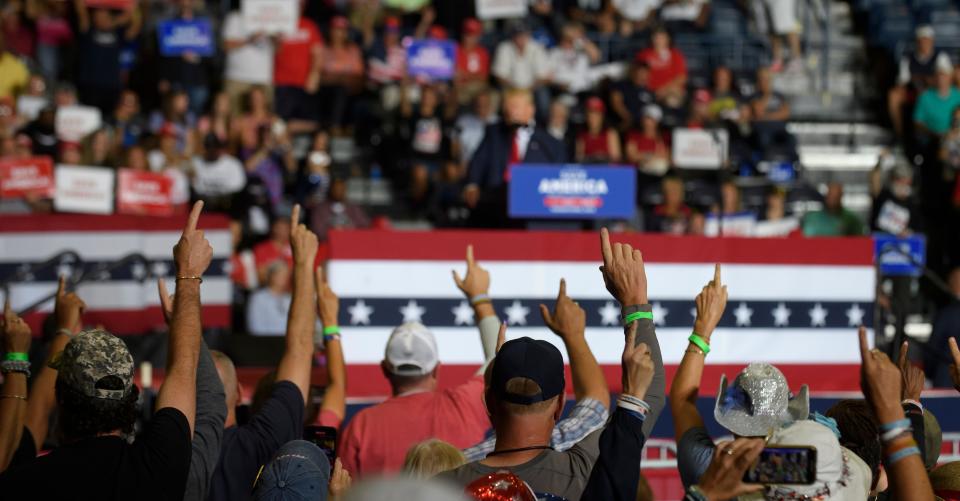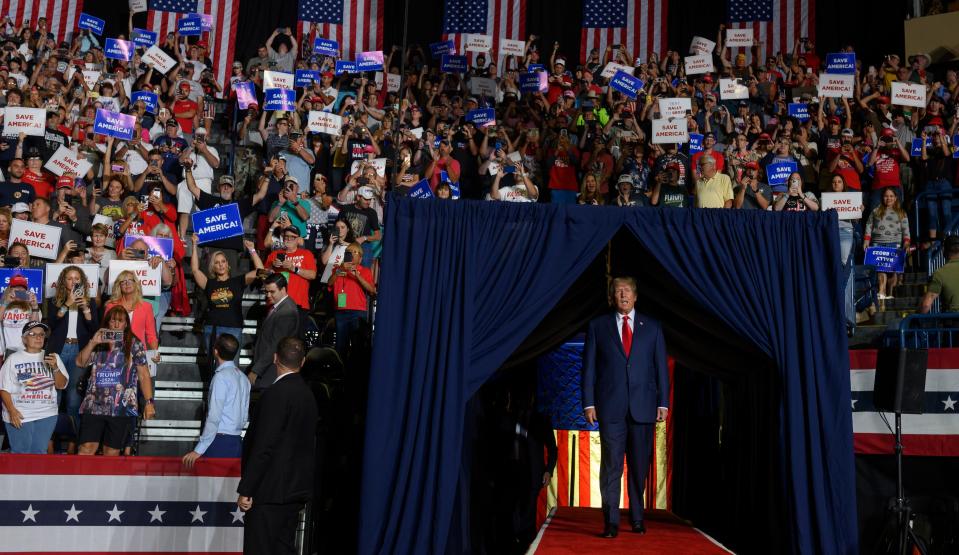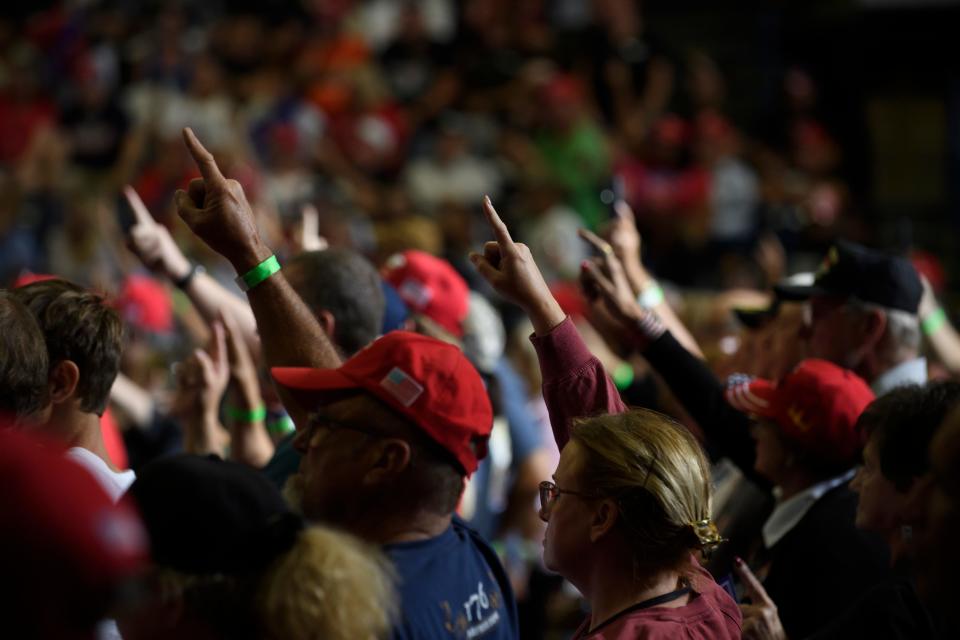Donald Trump embraces QAnon again at North Carolina rally as ties to violence raise concern
WASHINGTON —In recent weeks, former President Donald Trump has openly embraced the QAnon conspiracy theory in his social media postings and at political rallies, even as the number of real-world violent episodes – including killings – associated with the group continue to grow.
Trump's rally a week ago in Youngstown, Ohio raised concern when he spoke over a signature song tied to the group while his supporters raised their arms and their pointer fingers skyward in support. The same sequence happened again last night at a Trump rally in North Carolina, but private security guards asked at least some supporters to put their arms down, according to video of the event and reporters who were present.
"Confirmed w people at Trump rally who held 1 finger up that they meant it as a symbol of QAnon’s “Where We Go One We Go All” and further… Security staff here fanned out and told people to take down their fingers," PBS NewsHour correspondent Lisa Desjardins tweeted.
In return, followers of QAnon, which the FBI has called a domestic extremism threat, have celebrated Trump’s public support. Trump's actions confirm their belief he is leading a clandestine mission to destroy the so-called Deep State, reclaim the presidency and bring the Democrats, the media and other “anti-Christian” enemies to justice, religious extremism experts and some QAnon followers say.
What has Trump said and done as of late to signal his support for QAnon after years of maintaining a friendly but arms-length relationship with the group? And what are the potential repercussions? USA TODAY conducted research on the organization and interviewed experts about it to decipher what is going on, why it matters – and what might happen next.
More: Do Trump's attacks on DOJ cross a line? Comments raise concern about illegal incitement.
What did Trump do to openly embrace QAnon?
On Sept. 3, Trump raised eyebrows by referencing QAnon themes in his speech during a campaign rally in Wilkes-Barre, Pennsylvania, for Republican candidates he is supporting. A song almost identical to QAnon’s theme song, “Wwg1Wga," was also played to close out the rally.
The same song also appeared in a recent Trump campaign-style video. And while a Trump spokesman said it’s actually a different song, it sounds virtually identical to QAnon's, which is an acronym and abbreviation for the group's rallying cry, “Where we go one, we go all.”
And then last Saturday night, Trump again used the same song during the Youngstown rally for GOP Senate candidate J.D. Vance. It came at the end of one of Trump’s speeches about the decline of America and the dangers posed by the administration of President Joe Biden, who Trump again claimed falsely he beat in the 2020 election.
As the ominous music played during Trump’s closing remarks, some supporters in the crowd raised their arms and held aloft their index finger. Some QAnon experts claim that was not only the group members’ way of saluting Trump, but of telling him that they had heard some sort of secret call to action that he was giving to them.
“Trump Sending a Clear Message Patriots,” one QAnon-linked account posted in response on Truth Social.
Trump also reposted an image of himself on his Truth Social platform on Sept. 13 wearing a Q lapel pin with the words “The Storm is Coming.” That’s a common reference in QAnon parlance to Trump’s final victory when he regains power and vanquishes his opponents.
More: Trump mocks J.D. Vance, saying the Ohio GOP candidate is trying to get on his good side

Trump's veiled QAnon support goes back years
Trump has referenced QAnon before, but much more indirectly, according to Media Matters, which has monitored the social media presence and public statements of both Trump and QAnon influencers and adherents.
Trump last engaged with QAnon in the spring of 2020 by retweeting QAnon-related social media posts, Carusone said, “but there was an arm's length. It was much more wink and nod, and maybe even just a wink.”
After that, Trump began retweeting some QAnon influencers on a variety of topics, which prompted some followers to tweet about how Trump was listening to them. “But it was much more spaced out. And it was before QAnon had fully metastasized, so the community was smaller,” Carusone said. “And they were having to jump through a couple of hoops in order to connect the dots” regarding what they believed was Trump’s support.
That summer, as QAnon began growing in prominence, then-president Trump said he wasn’t really aware of the movement, but that its supporters were patriots who should be credited for backing his administration.
“I’ve heard these are people that love our country,” he said at a White House press briefing in August 2020. “I don’t really know anything about it, except that they do supposedly like me.”
When a reporter mentioned how QAnon believed Satan-worshiping pedophile Democrats controlled the “Deep State,” and how only Trump could vanquish them, he responded, “I haven’t heard that, but is that supposed to be a bad thing or a good thing? If I can help save the world from problems, I’m willing to do it.”
By earlier this month, more than a third of the accounts Trump has amplified on his Truth Social platform in recent weeks have promoted QAnon by sharing the movement's slogans, videos or imagery, according to an Associated Press analysis of Trump's social media activity.
Will Trump’s embrace of QAnon have repercussions?
Many QAnon and Trump watchers say yes.
Angelo Carusone, president and CEO of Media Matters for America, said Trump’s newfound embrace of the group could easily spark more violence, even as QAnon followers already have been accused of going after people and government institutions they believe are blocking Trump’s return to power. He cited the case of a Michigan man allegedly obsessed with QAnon who shot and killed his wife and seriously injured his daughter on Sept. 11.
The National Consortium for the Study of Terrorism and Responses to Terrorism at the University of Maryland examined 100 QAnon sympathizers who committed crimes in the United States through August 2021. It found "that while QAnon presents a danger, it is not a traditional terrorist threat" that can easily be monitored or thwarted.
Some examples:
In 2018, according to FBI documents, a Nevada man used an armored truck to block traffic at the Hoover Dam and was later arrested with body armor, rifles, ammunition and a flash-bang device inside his vehicle. The FBI said the man talked to authorities about various QAnon conspiracy theories, and that he sent letters from jail with QAnon slogans "to President Trump and other officials claiming he wanted to expose government corruption and lies," according to an FBI intelligence assessment circulated in 2019.
In early 2019, a man influenced by QAnon, Anthony Comello, allegedly shot to death a reputed top-level mobster outside his home on Staten Island. At a court hearing, Comello opened his hand to display a large "Q" symbol surrounded by pro-Trump slogans like “MAGA forever.” His lawyer told The Washington Post that QAnon and "other extreme right-wing conspiracy websites, as well as statements made by the president" would be central to his client's defense.
Last year a California man took his two young children to Mexico and killed them with a spearfishing gun, claiming he had been enlightened by QAnon and other conspiracy theories that foretold how they would turn into monsters.
And earlier this month, a QAnon-linked Pennsylvania man wearing a rainbow clown wig allegedly stormed into a Dairy Queen with a loaded gun and told authorities he was trying to "kill Democrats and liberals" and restore Trump to the presidency.
“It's one thing when a QAnon personality who has a show or is an influencer is encouraging vigilantism or extra-legal measures. It's another thing though, when Trump himself starts to validate it – and that's what is distinct about this moment,” said Carusone, a longtime Trump and QAnon watcher and authority on right-wing and religious extremism.
Mike Rothschild, author of the 2021 book, “The Storm is Upon Us: How QAnon Became a Movement, Cult, and Conspiracy Theory of Everything,” agreed Trump’s messaging to the group is potentially perilous given the polarization that already exists in America over Trump and his continuing false claims of a stolen election.
“This is still the leader of the Republican Party. This is the presumptive nominee for 2024. And he is deepening his embrace of a conspiracy theory cult that has been responsible for a number of crimes,” said Rothschild. “So it's definitely concerning.”
Rothschild said it doesn’t matter to what degree Trump is intentionally reaching out to QAnon supporters. What is concerning, he said, “is the amping up of his rhetoric and the intensity of his support. These are people who are ramping up for real violence or some sort of real organized opposition, and they will take [Trump’s support] and run with it and interpret it for whatever they want it to mean.”

What is QAnon?
According to Carusone and other QAnon experts, the group began in 2017 as one of many online pro-Trump conspiracy theory organizations. The short version is that one person named Q, or possibly several people, held super-high clearances within the federal government, and were working in secret with Trump to expose and neutralize evildoers within the government and the broader U.S. political apparatus. They believed that these enemies, including Hillary Clinton and numerous Hollywood celebrities, are Satanic cannabilistic pedophiles who have trafficked children amongst each other and even drank their blood.
The theory has been widely debunked by a range of experts and there is no credible evidence to back it up. Nevertheless, Q became this mysterious online entity who began dropping mysterious clues and messages, known as “Q Drops,” to an increasingly large group of followers and supporters so they could decipher them. “It was portrayed as the ultimate battle between good and evil,” Carusone told USA TODAY.
And because QAnon followers believed they were part of the solution, however outlandish, they became very invested – and even obsessed with it, he said.
Many QAnon adherents believed the Jan. 6, 2021, insurrection at the U.S. Capitol was the “storm” they had been waiting for and working toward. But when Trump didn’t regain the presidency, some followers became disillusioned, and even more anti-government. More recent events, including the FBI’s Aug. 8 search of Trump’s Florida estate Mar-a-Lago, have made QAnon supporters even more convinced of the narrative that the ultimate battle between good and evil is at hand.
How big is QAnon?
Estimates vary widely. At the outset, it gained popularity rapidly, especially as its Christian nationalistic and anti-government message overlapped with many other groups, especially those supporting Trump's "big lie" about the stolen election.
QAnon became an international phenomenon thanks to a large and expanding presence on social media like Facebook, YouTube and Twitter. After the Capitol attack, most social media platforms got far more aggressive in shutting down accounts linked to QAnon. But that only drove its followers underground, making it virtually impossible to determine the breadth and depth of its support, according to Carusone and Rothschild.
But Robert Pape, a University of Chicago professor and expert on political violence, believes QAnon has a wide following among Americans, especially those with an anti-government bent who might be inclined to act on it if they believe Trump is asking them to.
After Trump's most recent rally, Pape warned he is intentionally reaching out to QAnon supporters in a way that is "threatening" and "extremely disturbing."
"The former president is willing to court not just supporters of his but those who support violence for his goals – number one of which is being restored to the White House," Pape said during an appearance on CBS News' Face the Nation.
Pape's research found 13 million Americans "support the use of force to restore Donald Trump to the presidency." And QAnon followers, he warned on CBS, could become a particularly active element of that opposition group.

Is QAnon dangerous?
The FBI believes it is, and has been warning about it since at least May 2019.
That month, the bureau's Arizona field office circulated a detailed intelligence bulletin assessing what it said was the growing threat posed by people who believed in fringe conspiracies including Qanon and "Pizzagate" a similar theory about secret government conspirators and child sex traffickers.
The FBI said such “fringe political conspiracy theories very likely motivate some domestic extremists to commit criminal, sometimes violent activity.” Trump himself was mentioned in the intelligence bulletin, as being at the center of the QAnon theory and for being the impetus for at least one incident committed by one of the group's followers.
Following Jan. 6, 2021, the FBI said, it arrested more than 20 self-identified QAnon adherents who participated in the attempted siege of the Capitol.
That June, it circulated an unclassified intelligence assessment to law enforcement agencies concluding that, "The participation of some domestic violent extremists (DVE) who are also self-identified QAnon adherents in the violent siege of the US Capitol on 6 January underscores how the current environment likely will continue to act as a catalyst for some to begin accepting the legitimacy of violent action."
More: A White House summit on hate-fueled violence and another QAnon murder
The FBI bulletin said Ashli Babbitt, the 35-year-old Air Force veteran and fervent Trump supporter shot and killed during the Jan. 6 insurrection, had been sharing QAnon-related content on social media as early as 2019.
On Jan. 6, 2021, the FBI said, it arrested a self-identified QAnon adherent from North Carolina in Washington on charges of interstate communication of threats after allegedly bringing firearms and ammunition to the capital and making threats against House Speaker Nancy Pelosi.
The next day, the FBI said, it arrested an Oregon-based self-identified QAnon adherent on charges of destroying government property after allegedly firing several rounds at an Oregon federal courthouse.
The FBI bulletin also noted that "QAnon narratives are constantly expanding" to include false information about current events, including alleged election fraud, the COVID-19 pandemic, and the dangers of 5G technology that are "then woven into the QAnon master narrative."
And it warned that some QAnon followers will become increasingly agitated as Trump fails to re-assume the presidency.
"We assess that some (domestic violent extremist) adherents of QAnon likely will begin to believe they can no longer 'trust the plan' referenced in QAnon posts and that they have an obligation to change from serving as 'digital soldiers' towards engaging in real world violence – including harming perceived members of the 'cabal' such as Democrats and other political opposition instead of continually awaiting promised actions which have not occurred," the FBI warned.
This article originally appeared on USA TODAY: Trump embrace of QAnon draws concern amid violence connected to group

